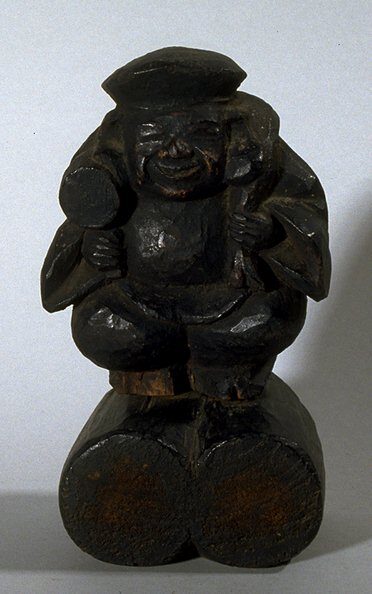Daikoku-ten (God of Good Fortune)
Japanese

Description
Ebisu (God of Prosperity)
Daikoku-ten (God of Good Fortune)
Japan, Edo period (1615–1868)
19th century
Wood
Gift of Mr. William Muschenheim,
1979/2.86 & 85
These wooden folk carvings depict Daikoku-
ten and Ebisu, two of the seven lucky gods
(shichi fukujin) of the indigenous Japanese
Shinto religion. Daikoku-ten (right), the god
of good fortune, is associated with farmers.
He sits astride two large barrels of rice and
carries a large sack brimming with treasure. In
his right hand he holds a magic mallet, said to
be able to produce anything the heart desires
when struck. This sculpture is carved from
wood, but during the Edo period it might have
been made of rice, which was not only a source
of food and a sign of a bountiful harvest, but a
form of currency.
Ebisu (left) is the god of prosperity and is
especially associated with fishermen. Here
he carries a large sea bream or red snapper
symbolizing good fortune. Both Ebisu and
Daikoku-ten are associated with the kitchen
and they were often enshrined there together
to bring prosperity to the family.
2021 Gallery Rotation
__________
These wooden folk carvings depict Daikoku and Ebisu, two of the seven lucky gods (shichi fukujin) of Japanese mythology. Known as the god of good fortune, Daikoku is associated with farmers. Sitting astride two large barrels of rice, Daikoku carries over his shoulder a large sack, brimming with treasure, and in his right hand holds a magic mallet, said to be able to produce anything the heart desires when struck. Though this statue is carved from wood, during the Edo period it was common for such figures to be made of rice, which was not only a source of food and a sign of a bountiful harvest, but a form of currency. Ebisu is the god of prosperity and especially associated with fishermen. Here he carries a large sea bream or red snapper symbolizing good fortune.
Ebisu and Daikoku are both associated with the kitchen and were often enshrined there together to bring fortune and prosperity to the family. These two lucky gods can be found depicted in many folk paintings, including the art of Otsu-e.
(Gallery Rotation Fall 2011)
Gallery Rotation Fall 2011
Daikoku-ten (God of Good Fortune)
Japan, Edo Period (1615–1868)
19th century
Wood
Gift of Mr. William Muschenheim, 1979/2.85
Ebisu (God of Prosperity)
Japan, Edo Period (1615–1868)
19th century
Wood
Gift of Mr. William Muschenheim, 1979/2.86
These wooden folk carvings depict Daikoku and Ebisu, two of the seven lucky gods (shichi fukujin) of Japanese mythology. Known as the god of good fortune, Daikoku is associated with farmers. Sitting astride two large barrels of rice, Daikoku carries over his shoulder a large sack, brimming with treasure, and in his right hand holds a magic mallet, said to be able to produce anything the heart desires when struck. Though this statue is carved from wood, during the Edo period it was common for such figures to be made of rice, which was not only a source of food and a sign of a bountiful harvest, but a form of currency. Ebisu is the god of prosperity and especially associated with fishermen. Here he carries a large sea bream or red snapper symbolizing good fortune.
Ebisu and Daikoku are both associated with the kitchen and were often enshrined there together to bring fortune and prosperity to the family. These two lucky gods can be found depicted in many folk paintings, including the art of Otsu-e.
Subject Matter:
Daikoku is one of the seven lucky gods (shichi fukujin) of Japanese mythology; he is associated with farmers. Though this statue is carved from wood, during the Edo period it was common for such figures to be made of rice, which was not only a source of food and a sign of a bountiful harvest, but a form of currency.
Like Ebisu, Daikoku is also associated with the kitchen and were often enshrined there together to bring fortune and prosperity to the family. A lucky god, he can be found depicted in many folk paintings, including the art of Otsu-e.
Physical Description:
This woodwork depicts Daikoku, the god of good fortune, who is associated with farmers. Here he is sitting astride two large barrels of rice, while carrying over his shoulder a large sack, brimming with treasure. In his right hand he holds a magic mallet, said to be able to produce anything the heart desires when struck.
Usage Rights:
If you are interested in using an image for a publication, please visit https://umma.umich.edu/request-image/ for more information and to fill out the online Image Rights and Reproductions Request Form.